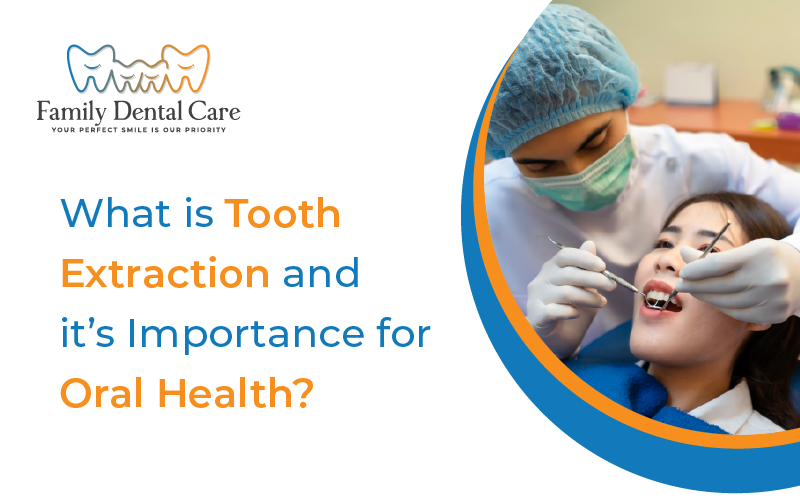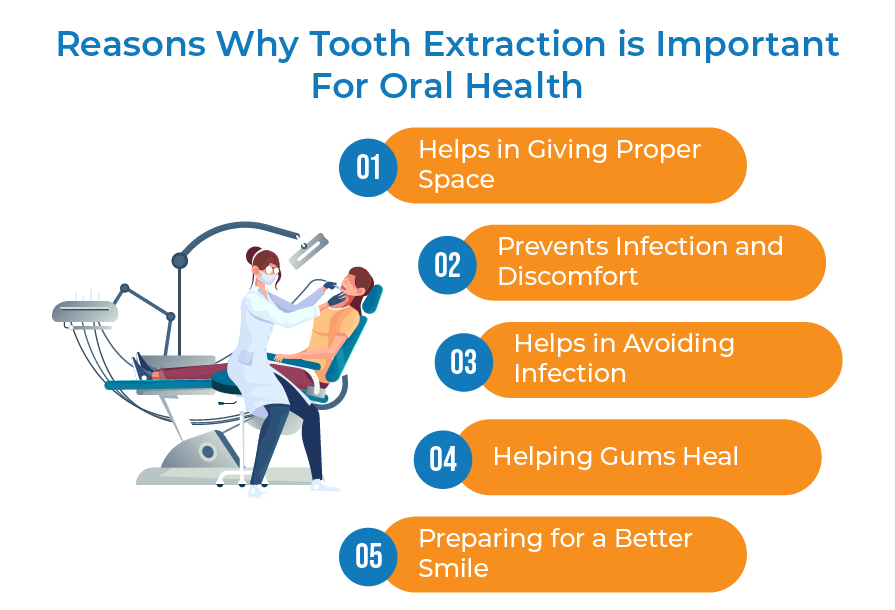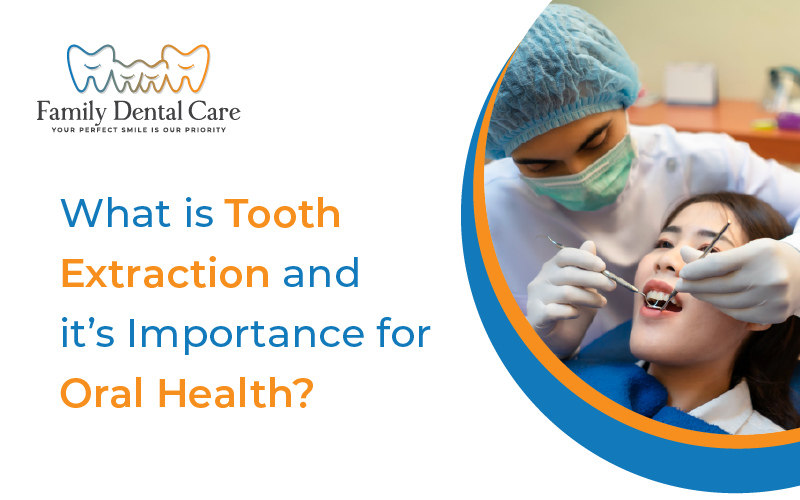
Tooth extraction is a common dental procedure that plays an essential role in maintaining oral health.
The process of dental extraction is not as intimidating as it may seem, but it can benefit your radiant smile in ways you had not considered.
Dentists or oral surgeons will thoroughly check your mouth, gums, and wisdom teeth before extraction.
They make sure that your wisdom teeth extraction procedure is as painless as possible by numbing the area before extracting the tooth.
But before that, you need to understand what tooth extraction is, its risks, benefits, and reasons why it is important for maintaining oral health.
What is Tooth Extraction?
A dental procedure known as a tooth extraction, which is usually carried out by an oral surgeon, involves taking a tooth out of its socket or dental alveolus. You will be recommended tooth extraction treatment if you have these issues-
1. Gum disease
2. Cavities or tooth decay
3. Tooth luxation
4. Fractured tooth
5. Dental injuries
6. Crowded and impacted tooth
It is typically performed due to severe decay, infection, impacted wisdom teeth, or orthodontic treatment.
The process can involve simple pulling or surgical removal, depending on the tooth’s condition and position.
It will normally take a few days to recover after the extraction process, but take the following steps to ensure your recovery goes smoothly.
– Apply an ice pack after extraction to reduce swelling.
– Leave the gauze pad on for 3 to 4 hours, until the pad is soaked.
– Take painkillers and medications prescribed by your dentist.
– Don’t rinse at least for 24 hours, and spit gently after tooth extraction.
What Are The Risks Associated With Tooth Extraction?
Understanding the risks associated with dental extraction can help you make an informed decision if you’re considering this treatment option.
– The extraction site can become infected, especially if the area is not properly cared for after the procedure.
– A painful condition known as a “dry socket” arises when the blood clot at the extraction site either dissolves or fails to form before the wound has healed.
– Adjacent teeth or dental restorations (like crowns or bridges) may be damaged during the extraction process.
-Nerve damage can occur during the removal of wisdom teeth, which can lead to numbness, tingling, or pain in the tongue, chin, lips, or gums.
What Are The Benefits of Tooth Extraction?

– Tooth removal can alleviate pain caused by severe decay, infection, or crowding.
– If a tooth is severely infected and cannot be saved by other treatments, then tooth extraction is the best option as it helps to prevent the infection from spreading.
– Extracting a problematic tooth can prevent further oral health issues and improve the alignment and functionality of the remaining teeth.
– Tooth extraction can create the necessary space in the mouth to properly align the teeth, which is important in orthodontic treatment.
Type of Tooth Extractions
The two types of dental extractions include-
1. Simple Extractions
– Simple extractions involve teeth that are completely visible above the gum line, including wisdom teeth extraction.
– During the procedure, your dentist will use a tool to carefully loosen the tooth from its socket.
– Then, they’ll use dental forceps to fully remove the tooth from your mouth.
– Typically, you won’t need stitches after a simple extraction, though sometimes they might be necessary.
– The tooth has to come out in one piece to qualify for a simple extraction.
2. Surgical Extractions
– This common dental procedure is used to remove teeth that cannot be easily accessed or removed through simple extraction methods.
– Surgical extractions are more complex than simple extractions and generally require the skills of a specialist, such as an oral surgeon.
– Any bone fragment obstructing the tooth root could be removed.
– The area is cleaned of any debris from the bone or tooth and the incision is stitched up to facilitate healing.
– Instructions for home care, provided by the dentist for your dental needs, may include medications for pain and swelling, as well as dietary recommendations.
Reasons Why Tooth Extraction is Important For Oral Health

Tooth extraction treatment can sound a bit scary, but it’s sometimes necessary for keeping your mouth healthy. Here are the reasons why tooth extraction is important for maintaining oral health-
– Helps in Giving Proper Space
Sometimes, your mouth can get crowded, and teeth may not have enough space. Tooth removal can give other teeth space to grow properly.
– Prevents Infection and Discomfort-
A tooth that hurts a lot usually means something is wrong. Removing it can help stop the pain and prevent future discomfort.
Helps in avoiding infection a tooth is very damaged or decayed, it can lead to infections that might spread. Taking it out can keep your whole mouth safer.
– Helping Gums Heal-
Bad teeth, including problematic wisdom teeth, can make your gums sick too. Removing these teeth, especially through wisdom teeth extraction, helps your gums get better and stay healthy.
– Preparing for a Better Smile –
Sometimes, to get braces or other treatments to make your smile nicer, a tooth needs to come out first. This helps everything fit better in the end.
Tooth Extraction Aftercare
Tooth extraction aftercare can vary depending on a few factors.
Day 1 to 2
Here are a few tips for the first two days of aftercare-
1. Do not spit.
2. Rest at least for 24 hours after tooth extraction.
3. Avoid using straws, as they place a lot of pressure on wounds which can dislodge the blood clot.
4. Avoid smoking for the first couple of days after a dental extraction as the blood clot forms. This is crucial to prevent complications associated with smoking and tooth extraction healing processes.
5. Use extra pillows while sleeping to elevate the head.
Days 3 to 10
It’s important to take extra steps after the clot has formed to maintain oral hygiene and other issues.
1. Throughout the healing process, you should eat soft foods that do not require any kind of pressure and chewing, as well as being unlikely to become trapped in an empty socket.
Avoid having hard toast, foods that contain seeds, and chips. Instead of that, have applesauce, soups, soft food, and yogurt.
2. Brush and floss your teeth by using saline solution or any medicated mouthwash recommended by your dentist.
3. Gently try to rinse your mouth with lukewarm water or saline solution, when the clot is securely in place. This helps in killing the bacteria from the mouth, which might lead to infections as the mouth heals.
Conclusion
If your dentist has told you to have a tooth extraction, they will likely perform a simple or surgical extraction.
Regardless of the type of extraction method your dentist will perform, you will be made comfortable and calm at Family Dental Care.
To get back your healthy smile and eliminate infection, tooth extraction is the best way to pull out teeth. Consulting with a dentist in Simi Valley ensures that you receive expert care and advice tailored to your dental health needs.

